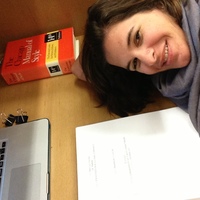
Chiara Di Serio
Currently: ONISILOS-MSCA Cofund Fellow, Department of Classics and Philosophy, University of Cyprus.
PI of the project "Alexander's letters in the context of ancient diplomacy: between history and fiction". This project is included in the Onisilos programme, co-funded from the European Union’s Horizon 2020 programme under the Marie Skłodowska-Curie Grant Agreement No 101034403
– 2023-2024: Visiting Professor in Ancient Greek Studies, IHAC, Northeast Normal University, Changchun
– 2022-2023: Research Assistant, Department of Classics and Philosophy, University of Cyprus
– 2021-2023: Post-doctoral Research Affiliate, Center for Religious Studies, Central European University
– 2016-2020: PhD in History of Religions, Department of History, Anthropology, Religions, Arts and Performing Arts, University of Rome "La Sapienza"
PI of the project "Alexander's letters in the context of ancient diplomacy: between history and fiction". This project is included in the Onisilos programme, co-funded from the European Union’s Horizon 2020 programme under the Marie Skłodowska-Curie Grant Agreement No 101034403
– 2023-2024: Visiting Professor in Ancient Greek Studies, IHAC, Northeast Normal University, Changchun
– 2022-2023: Research Assistant, Department of Classics and Philosophy, University of Cyprus
– 2021-2023: Post-doctoral Research Affiliate, Center for Religious Studies, Central European University
– 2016-2020: PhD in History of Religions, Department of History, Anthropology, Religions, Arts and Performing Arts, University of Rome "La Sapienza"
less
Related Authors
Cristiana Facchini
Università di Bologna
Giulia Sissa
Ucla
Francesco Camia
Università degli Studi "La Sapienza" di Roma
Amanda J. Lucia
University of California, Riverside
Seth Bernard
University of Toronto
Francesca Gazzano
University of Genova
Jan N . Bremmer
University of Groningen
Karl Baier
University of Vienna
Christoph Uehlinger
University of Zurich, Switzerland
Maria Stamatopoulou
University of Oxford










Uploads
Books by Chiara Di Serio
Papers by Chiara Di Serio
In a lesser known mythological tradition Eros is the son of Iris and Zephyros. His mother, Iris, belongs to a lineage of winged beings who are connected to a pre-cosmic dimension that precedes the historical reality ruled and guaranteed by Zeus. His father, Zephyros, is a wind and also a winged being whose story is linked to the birth of other superhuman beings who contribute to the foundation of a reality not yet fully established. Equally, Eros is a primordial superhuman being, whose nature at a mythical level is that of preceding the foundation of the cosmos. The purpose of this work is to investigatethrough the meanders of mythological heritagewhich elements of the narratives referring to these characters are relevant to classical Greek culture.
This research deepens the dynamics underlying the text, starting from the analysis of the narrative pathway that progressively follows the advancement of Alexander and his army, who are able to conquer the territory thanks to a skillful use of weapons and the endurance of the soldiers. The Indian space, especially in King Porus' palace, conceals immeasurable treasures, but the Macedonians have to fight with weapons against terrifying beings, monsters and wild animals. They also have to face extraordinary atmospheric phenomena. War moves from a real historical dimension to an to an out-of-history, timeless perspective because it is devoid of enemies that are concretely human. At the end of the story Alexander is said to have built gold pillars and five gold trophies for himself, to affect his victories and travels. Examining the matter well, it emerges that he represents the new order of the cosmos, because he has now subdued the world.
Thus, the main aim of this investigation is to demonstrate how the Epistola reveals the mechanisms through which the Western thought has devised a "mythical" description of India that is both attractive and terrible at the same time. The mythologization of the ethno-geographic view emerges powerfully to strengthen the dual device of self-identification and exclusion of the Other, who - through a process of "colonization" of the imaginary - is bound to become a subject to Western domination.
In a lesser known mythological tradition Eros is the son of Iris and Zephyros. His mother, Iris, belongs to a lineage of winged beings who are connected to a pre-cosmic dimension that precedes the historical reality ruled and guaranteed by Zeus. His father, Zephyros, is a wind and also a winged being whose story is linked to the birth of other superhuman beings who contribute to the foundation of a reality not yet fully established. Equally, Eros is a primordial superhuman being, whose nature at a mythical level is that of preceding the foundation of the cosmos. The purpose of this work is to investigatethrough the meanders of mythological heritagewhich elements of the narratives referring to these characters are relevant to classical Greek culture.
This research deepens the dynamics underlying the text, starting from the analysis of the narrative pathway that progressively follows the advancement of Alexander and his army, who are able to conquer the territory thanks to a skillful use of weapons and the endurance of the soldiers. The Indian space, especially in King Porus' palace, conceals immeasurable treasures, but the Macedonians have to fight with weapons against terrifying beings, monsters and wild animals. They also have to face extraordinary atmospheric phenomena. War moves from a real historical dimension to an to an out-of-history, timeless perspective because it is devoid of enemies that are concretely human. At the end of the story Alexander is said to have built gold pillars and five gold trophies for himself, to affect his victories and travels. Examining the matter well, it emerges that he represents the new order of the cosmos, because he has now subdued the world.
Thus, the main aim of this investigation is to demonstrate how the Epistola reveals the mechanisms through which the Western thought has devised a "mythical" description of India that is both attractive and terrible at the same time. The mythologization of the ethno-geographic view emerges powerfully to strengthen the dual device of self-identification and exclusion of the Other, who - through a process of "colonization" of the imaginary - is bound to become a subject to Western domination.
Time: Friday, 28/Jun/2019: 9:15am - 11:15am Location: Philosophicum (Jakobi 2) - 110
Session Chair: Francesco Berno
Presentations:
Ir/rational Enkrateia? The Greek Gospel according to the Egyptians and Its (Early) Interpretations by Andrea Annese
The Reception of Philo’s Reincarnational Soteriology in Clement by Sami Yli-Karjanmaa
Athanasius and the Gods of the Others by Chiara Di Serio
Time: Wednesday, 26/Jun/2019: 9:15am-11:15am Location: Philosophicum (Jakobi 2)-110
Session Chair: Daniel Barbu Session Chair: Francesco Massa
Presentations:
Achilles and Polyxene as Adam and Eve: Trojan mythology as a new Genesis story in the Jewish-Christian Pseudo-Clementine novel (4th c.) by Benjamin Marguerite De Vos
Mythology versus History: Phaeton and Judaism in Orosius's Historiae adversus paganos 1,10,19 by Elisa Manzo
The Curetes between Greek and Christian traditions by Mélanie Lozat
Adversus Nationes: the Controversy against Polytheism by Chiara Di Serio
We welcome papers which address these and similar questions. In addition, we also invite papers which explore the archaeological contexts of carmina minora such as verse inscriptions.
Papers: The language of the conference is English. The time allocated for a paper is 20-25 minutes, with a further 5-10 minutes allowed for questions or discussion.